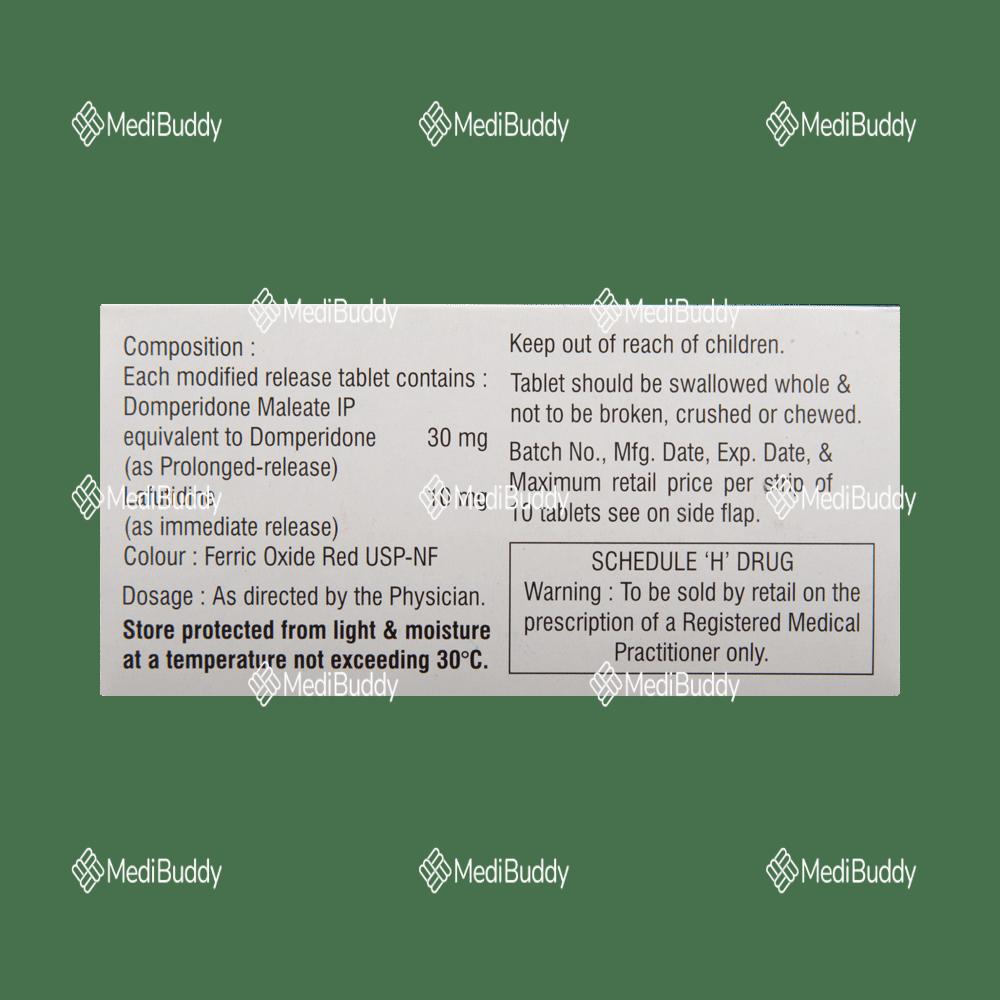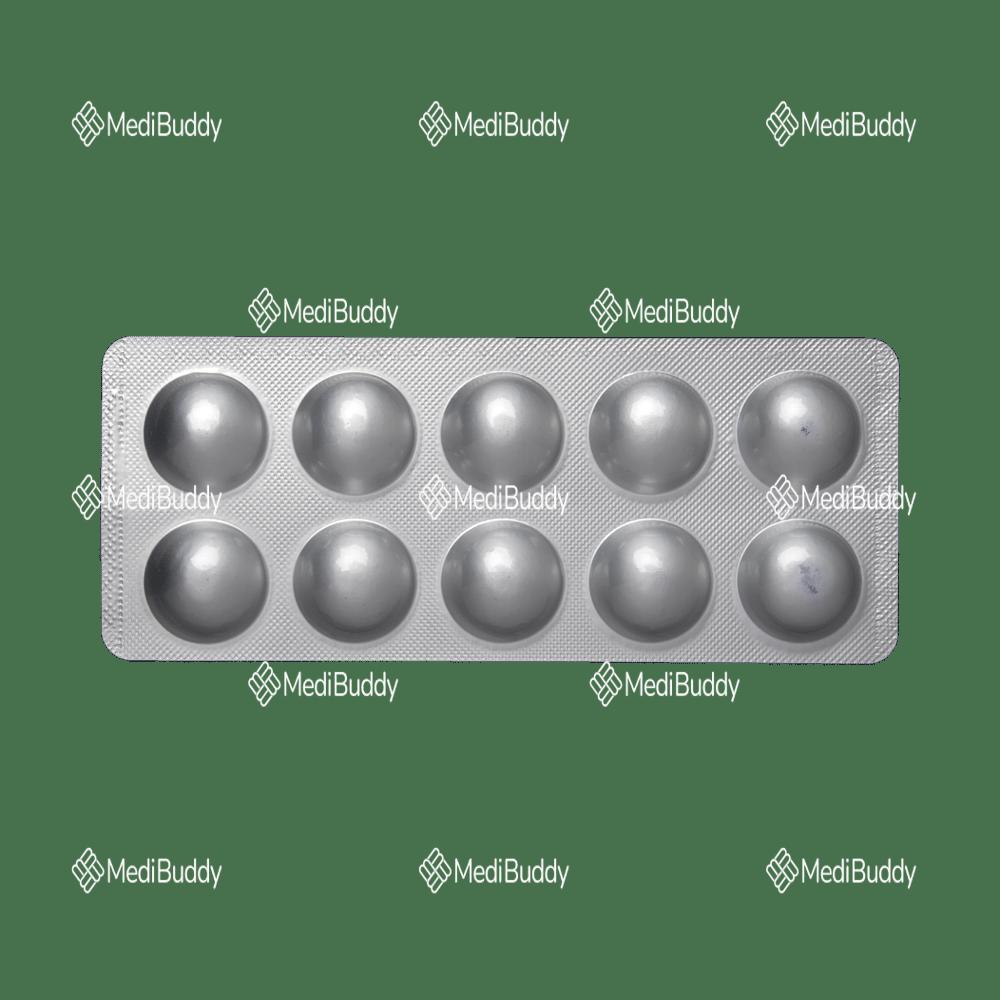Lafaxid-D Tablet
By Lafaxid-D
Rx
10 Tablet in a Strip

Composition
Lafutidine(10mg) + Domperidone(30mg)

Manufacturer - Zuventus Healthcare Ltd
Office No. 5119, 5th Floor, 'D' Wing, Oberoi Garden Estates, Chandivili, Andheri (E), Mumbai - 400 072.

Expires on or after
March, 2026
About Lafaxid-D Tablet
Lafaxid-D Tablet is a prescribed medication used to treat conditions like gastroesophageal reflux disease (Acid reflux) and peptic ulcer disease. It helps in easing symptoms such as heartburn, stomach pain, and irritation by neutralizing acid production in the stomach, thus preventing discomfort. The tablet is part of a group of medicines known as gastrointestinal agents which are effective in managing GERD and peptic ulcers.
The tablet contains a combination of two active ingredients – Lafutidine, an H2 receptor antagonist, and Domperidone, a dopamine antagonist. Lafutidine acts by blocking histamine H2 receptors on the stomach lining, thereby decreasing gastric acid secretion. On the other hand, Domperidone works by enhancing stomach muscle movements and contractions, aiding in the digestive process.
It is crucial to follow the dosage and duration of Lafaxid-D Tablet as instructed by your doctor. The prescribed dose will vary based on your medical condition and response to the medication. It is advised not to discontinue the treatment prematurely, as it could result in symptom recurrence and potential worsening of the condition. Inform your healthcare provider about all the medications you are currently taking as some may interact with Lafaxid-D Tablet.
Common side effects associated with Lafaxid-D Tablet include nausea, diarrhea, dry mouth, fatigue, headache, muscle pain, and elevated uric acid levels in the blood. These side effects are usually temporary and tend to resolve over time. If you experience any persistent or concerning side effects, do consult your doctor promptly. Additionally, the medication may induce sleepiness and drowsiness, hence caution is advised while driving or operating machinery.
Patients should inform their doctor before taking Lafaxid-D Tablet if they are pregnant, planning pregnancy, breastfeeding, or have a history of liver or kidney diseases. It is essential to disclose all relevant health information to ensure the appropriate dosage is prescribed. Lifestyle modifications, such as avoiding hot beverages and spicy foods, can complement the treatment for optimal results.
In summary, Lafaxid-D Tablet is a valuable medication for managing GERD and peptic ulcers, containing a combination of Lafutidine and Domperidone to address acid-related symptoms effectively. Adhering to the prescribed dosage, keeping track of possible side effects, and maintaining open communication with healthcare providers are key considerations for safe and effective treatment.
Benefits
Lafaxid-D Tablet offers multiple benefits in the treatment of Gastroesophageal reflux disease (GERD) and Peptic ulcer disease. In GERD, which is a chronic condition characterized by excess production of acid in the stomach, this drug helps by reducing the amount of acid produced. This reduction in acid production not only alleviates the pain associated with heartburn and acid reflux but also aids in managing the symptoms effectively. To enhance the effectiveness of the medication, it is crucial to follow the prescribed dosage carefully and make certain lifestyle adjustments. Simple changes like identifying and avoiding trigger foods, consuming smaller and more frequent meals, maintaining a healthy weight, and practicing relaxation techniques can greatly complement the drug's action in relieving GERD symptoms. Additionally, refraining from eating close to bedtime is recommended to optimize the treatment outcome for GERD.
For Peptic ulcer disease, Lafaxid-D Tablet plays a pivotal role in the healing process of painful sores or ulcers in the stomach or intestine lining. By reducing the acid production in the stomach, the medication aids in preventing further damage to the ulcer, allowing it to heal naturally. It is essential to adhere to the prescribed dosage regimen consistently for the drug to be effective, even if the symptoms appear to have ameliorated. Depending on the underlying cause of the ulcer, additional medications may be prescribed alongside Lafaxid-D Tablet to facilitate comprehensive treatment. By following the healthcare provider's instructions diligently, patients can benefit from the healing properties of the drug and achieve relief from the discomfort associated with Peptic ulcer disease.
How to use the Lafaxid-D Tablet
To use Lafaxid-D Tablet, follow the instructions given by your doctor. Take the tablet whole, without chewing, crushing, or breaking it. It is important to take Lafumac DSR on an empty stomach for best results. Follow the prescribed dose and duration of treatment carefully. If you have any questions or concerns about how to use this medication, consult your doctor or pharmacist for further guidance. Remember to not alter the way you take Lafumac DSR without consulting your healthcare provider first.
Uses of Lafaxid-D Tablet
Lafaxid-D Tablet is commonly used for treating conditions such as gastroesophageal reflux disease, also known as acid reflux, and peptic ulcer disease. Gastroesophageal reflux disease is a condition where stomach acid flows back into the esophagus, causing symptoms like heartburn. Peptic ulcer disease involves the development of sores in the lining of the stomach or the first part of the small intestine. The medication is formulated to help alleviate the symptoms associated with these conditions and provide relief to individuals experiencing discomfort due to acid reflux or peptic ulcers. By targeting the underlying causes of these ailments, Lafaxid-D Tablet assists in managing the symptoms effectively.
What conditions Lafaxid-D Tablet treats?
Lafaxid-D Tablet is used for treating gastroesophageal reflux disease (Acid reflux) and peptic ulcer disease. It helps in relieving symptoms like heartburn, stomach pain, and irritation by neutralizing acid production in the stomach. For optimal results, follow your doctor's prescribed dose and duration. Inform your healthcare provider about all medications you are taking. Side effects like nausea, diarrhea, and drowsiness may occur but are usually temporary. Lifestyle adjustments such as avoiding trigger foods and eating smaller meals may also aid in managing symptoms. Prior to use, disclose pregnancy, breastfeeding, liver, or kidney conditions to your doctor.
Should you consult a doctor?
If you experience persistent or concerning side effects like nausea, diarrhea, dry mouth, fatigue, headache, muscle pain, drowsiness, dizziness, increased liver enzymes, protein in urine, or increased uric acid levels in the blood, it is important to consult your doctor promptly. Additionally, if you feel uneasy about any symptoms while taking Lafaxid-D Tablet, reach out to your healthcare provider for guidance. Do not discontinue the medication without discussing it with your doctor, as stopping prematurely may lead to the return of symptoms and worsening of your condition. Inform your healthcare team about all medications you are using to prevent potential interactions. If you are pregnant, planning pregnancy, breastfeeding, or have liver or kidney issues, disclose this information to your doctor for suitable dosage recommendation. Be cautious about alcohol consumption as it can compound drowsiness. Lifestyle adjustments such as consuming cold milk and avoiding hot beverages, spicy foods, and chocolate can enhance the effectiveness of the treatment.
Side effects of Lafaxid-D Tablet
When taking Lafaxid-D Tablet, you may experience some side effects as your body gets used to the medication. It's common to have nausea, diarrhea, dry mouth, fatigue, headache, muscle pain, drowsiness, or dizziness. In some cases, there may be an increase in liver enzymes, presence of protein in urine, or elevated uric acid levels in the blood. These side effects are usually mild and temporary, but if they persist or cause concern, it is important to consult your doctor.
Safety advice

liver
When using Lafaxid-D Tablet, it is important to exercise caution if you have liver disease. It may be necessary to adjust the dosage of this medication, so always consult your doctor before starting treatment. Lafaxid-D Tablet should not be used in patients with moderate to severe liver disease to ensure your safety and wellbeing. Please prioritize discussions with your healthcare provider to best manage your liver health while taking this medication.

kidney
When using Lafaxid-D Tablet, it is important to be cautious if you have kidney disease. Your doctor may need to adjust the dose accordingly. Always seek advice from your doctor regarding this.

alcohol
It is unsafe to drink alcohol while taking Lafaxid-D Tablet.

driving
When using Lafaxid-D Tablet, be cautious while driving. It may reduce alertness, impact vision, and cause drowsiness or dizziness. Refrain from driving if experiencing these symptoms.

pregnancy
Lafaxid-D Tablet should be avoided during pregnancy due to potential harm to the developing baby based on animal studies. Consult your doctor for personalized advice.

breastfeeding
It is better to consult your doctor before using Lafaxid-D Tablet.
Consumption warning before consuming Lafaxid-D Tablet
Before consuming Lafaxid-D Tablet, it is essential to follow important guidelines. This prescription medication treats gastroesophageal reflux disease (Acid reflux) and peptic ulcer disease, offering relief from symptoms like heartburn and stomach pain. To prevent discomfort, it also regulates acid production in the stomach.
Take Lafaxid-D Tablet as directed by your doctor, considering your specific condition and response to the treatment. Continuation of the medication as advised is crucial to prevent symptom recurrence or worsening. Inform your healthcare provider about all medications you are taking, as some could interact with this medicine.
Possible side effects include nausea, diarrhea, dry mouth, fatigue, headache, and muscle pain. These are usually temporary and can be managed. Be cautious of sleepiness or drowsiness; refrain from driving or tasks requiring mental alertness initially. Avoid alcohol consumption while on this medication, as it can intensify drowsiness. Lifestyle adjustments, like avoiding certain foods and beverages, can enhance the effectiveness of the treatment.
Inform your doctor if you are pregnant, planning pregnancy, breastfeeding, or have liver or kidney conditions. This ensures appropriate dosage adjustments for your safety and well-being.
What if you forgot to take Lafaxid-D Tablet?
If you forget to take a dose of Lafaxid-D Tablet, take it when you remember. But if it's nearly time for your next dose, just skip the missed one and continue with your normal dosing schedule. Avoid taking a double dose to make up for the missed one. This helps maintain the appropriate drug levels in your body and reduces the risk of side effects.
Additional Information
| Habit Forming | No |
| Chemical Class | - |
| Therapeutic Class | GASTRO INTESTINAL |
| Action Class | - |
FAQs
Disclaimer
The information provided on this website is to the best of our abilities to ensure it is accurate, reliable, and reviewed by a team of professionals. It should not be used to diagnose, prevent, or cure any health problem. The information presented here is not intended to create a doctor-patient relationship or replace a registered medical practitioner's advice, diagnosis, or treatment. The absence or provision of any information or warning regarding any medicine should not be assumed as an implied or explicit assurance of safety or efficacy. We highly recommend consulting your registered medical practitioner for all queries or doubts related to your medical condition. Do not ignore professional medical advice or delay seeking it based on the content encountered on our website. We intend to support, not replace, the doctor-patient relationship.
₹140.5
Inclusive of all taxes
Content verified by

Dr. Abdullah Khan
MBBS - General Medicine
Last update on 11-Feb-2025










